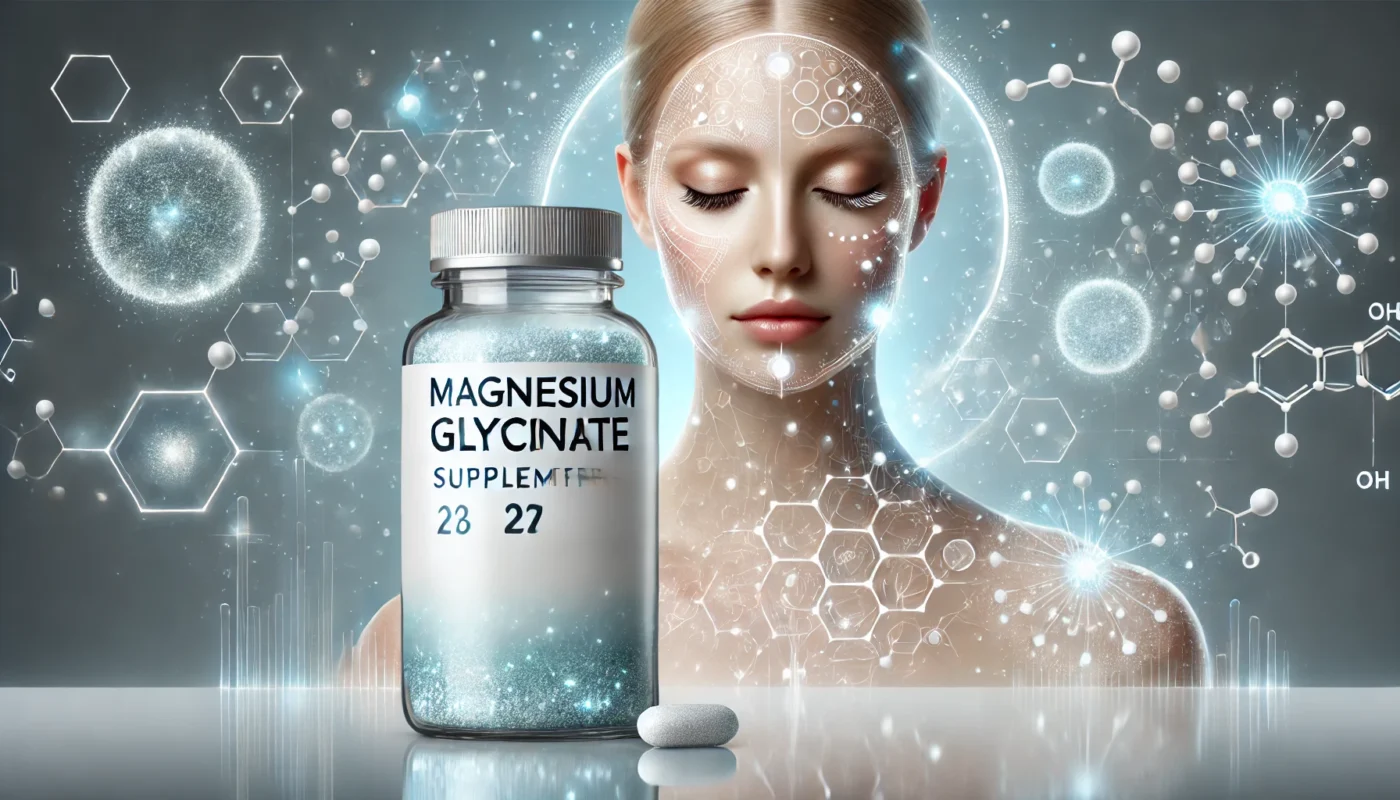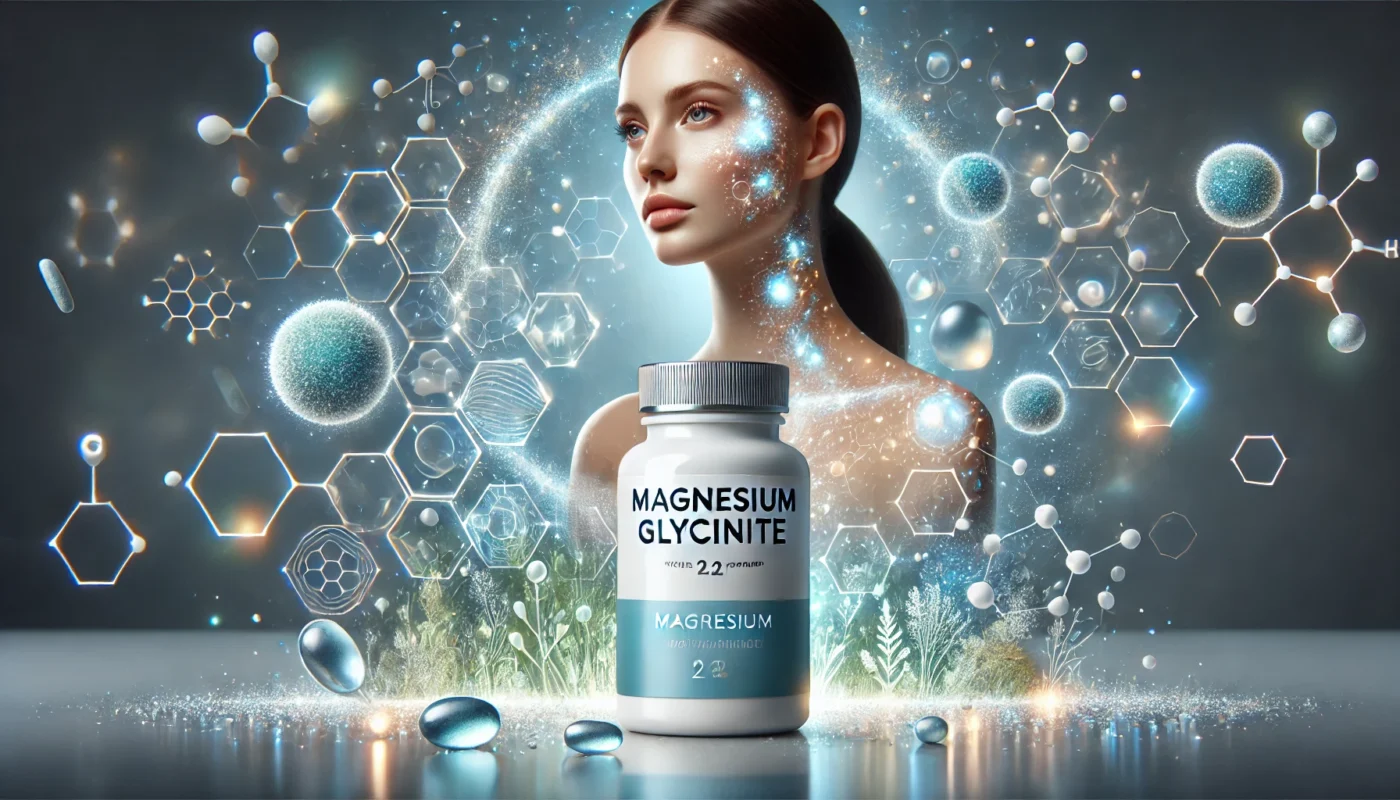Magnesium is an essential mineral involved in hundreds of biochemical reactions in the body, from energy production to nerve function. While its importance for bone health, muscle function, and stress reduction is well-documented, magnesium’s role in skin health is often overlooked. Magnesium glycinate, a highly bioavailable and gentle form of magnesium, offers unique benefits for maintaining healthy skin by reducing inflammation, supporting hydration, and promoting a glowing complexion.
This article explores the science behind magnesium glycinate’s impact on skin health, uncovering how it addresses common dermatological concerns and contributes to overall skin vitality.
You May Also Like:
Magnesium Glycinate’s Benefits for Dry Skin: Here’s the Science
Magnesium Glycinate’s Role in Enhancing Skin Barrier Function
Magnesium Glycinate for Skin Health: A Lesser-Known Benefit is an original (HSLHealing) article.
The Skin: A Reflection of Inner Health
The skin is the body’s largest organ, acting as a protective barrier and reflecting internal health. Its appearance is influenced by numerous factors, including:
- Inflammation: Chronic inflammation can lead to redness, irritation, and skin conditions like acne and eczema.
- Hydration: Proper hydration ensures the skin remains supple and free of dryness or cracking.
- Oxidative Stress: Free radicals can damage skin cells, accelerating aging and worsening skin conditions.
Magnesium is a key player in managing these factors, making it essential for maintaining skin health.

How Magnesium Glycinate Supports Skin Health
1. Reducing Inflammation
Chronic inflammation is a common underlying factor in many skin conditions, including acne, rosacea, eczema, and psoriasis. Magnesium plays a vital role in regulating inflammatory responses.
- Suppressing Pro-Inflammatory Cytokines: Magnesium helps regulate the production of cytokines, proteins that mediate inflammation. A study in The American Journal of Clinical Nutrition (2017) found that magnesium intake was inversely associated with levels of C-reactive protein (CRP), a marker of inflammation.
- Soothing Skin Irritation: Magnesium glycinate’s calming properties extend to the skin by helping reduce redness, swelling, and irritation caused by inflammatory skin conditions.
A 2020 study in Nutrients showed that individuals with chronic inflammatory conditions, including psoriasis, exhibited significantly lower magnesium levels, suggesting that supplementation could help reduce symptoms.
2. Supporting Collagen Synthesis
Collagen is the main structural protein in the skin, responsible for its elasticity and strength. Magnesium indirectly supports collagen production through its role in enzymatic reactions:
- Activation of Vitamin C: Magnesium aids in the activation of vitamin C, a cofactor required for collagen synthesis.
- Reducing Collagen Degradation: By mitigating oxidative stress, magnesium helps preserve existing collagen fibers, slowing the appearance of wrinkles and sagging.
A study published in The International Journal of Dermatology (2018) highlighted magnesium’s role in promoting dermal fibroblast activity, the cells responsible for producing collagen.
3. Combatting Oxidative Stress
Free radicals, generated by UV exposure, pollution, and stress, can damage skin cells and accelerate aging. Magnesium acts as a natural antioxidant, reducing oxidative stress and preventing cellular damage.
- Neutralizing Free Radicals: Magnesium supports the activity of glutathione, the body’s master antioxidant, which neutralizes harmful free radicals.
- Protecting Against UV Damage: Magnesium may enhance the skin’s ability to repair damage caused by ultraviolet (UV) radiation, reducing the risk of premature aging and hyperpigmentation.
A 2019 study in Oxidative Medicine and Cellular Longevity found that magnesium supplementation improved skin cell resilience to oxidative stress, reducing signs of aging in participants.
4. Hydrating and Balancing the Skin
Hydration is key to maintaining a healthy skin barrier. Magnesium glycinate improves hydration by regulating water balance at the cellular level:
- Maintaining Electrolyte Balance: Magnesium ensures proper cellular hydration by balancing sodium and potassium levels in the skin.
- Strengthening the Skin Barrier: A healthy skin barrier retains moisture and protects against environmental aggressors. Magnesium contributes to the production of ceramides, lipid molecules essential for barrier function.
In individuals with dry or sensitive skin, magnesium glycinate can help restore moisture levels, reducing flakiness and irritation.

Magnesium Glycinate and Specific Skin Conditions
1. Acne
Acne is often linked to inflammation, hormonal imbalances, and stress. Magnesium glycinate addresses these contributing factors through:
- Reducing Sebum Production: Magnesium helps regulate androgens, hormones that stimulate oil production in the skin.
- Calming Stress-Induced Breakouts: Magnesium glycinate reduces cortisol levels, minimizing stress-related acne flares.
- Preventing Bacterial Growth: Magnesium’s role in maintaining a balanced skin pH discourages the growth of acne-causing bacteria.
A 2019 study in Dermato-Endocrinology found that magnesium supplementation reduced the severity of acne lesions in participants with mild to moderate acne.
2. Eczema and Psoriasis
Eczema and psoriasis are chronic inflammatory skin conditions characterized by redness, itching, and scaling. Magnesium glycinate may alleviate symptoms through:
- Anti-Inflammatory Effects: Magnesium reduces inflammation, calming flare-ups and improving skin texture.
- Improving Skin Barrier Function: By enhancing hydration and ceramide production, magnesium strengthens the skin barrier, preventing further irritation.
In a clinical trial published in Magnesium Research (2020), participants with eczema who supplemented with magnesium experienced a 25% reduction in itching and redness after eight weeks.
3. Premature Aging
Signs of aging, such as wrinkles and loss of elasticity, are accelerated by oxidative stress and collagen degradation. Magnesium glycinate combats these effects by:
- Supporting collagen production and preserving existing collagen fibers.
- Neutralizing free radicals that cause DNA damage and cellular aging.
A study in Clinical Interventions in Aging (2017) found that magnesium supplementation improved skin elasticity and reduced the depth of wrinkles in middle-aged women.

How to Use Magnesium Glycinate for Skin Health
1. Dosage Recommendations
The recommended daily allowance (RDA) for magnesium varies by age and gender:
- Women: 310–320 mg per day.
- Men: 400–420 mg per day.
For skin health, a dosage of 200–400 mg of elemental magnesium from magnesium glycinate is typically effective. Check supplement labels for the exact amount of elemental magnesium provided.
2. Timing and Administration
- With Meals: Magnesium glycinate is best absorbed when taken with food.
- Split Doses: To enhance absorption and minimize the risk of side effects, split the daily dose into two or three smaller doses.
3. Pair with a Balanced Skincare Routine
Magnesium glycinate works best when combined with a comprehensive skincare routine:
- Use a gentle cleanser to remove dirt and excess oil without stripping the skin.
- Incorporate antioxidants, such as vitamin C or E, to complement magnesium’s effects on oxidative stress.
- Apply a moisturizer containing ceramides or hyaluronic acid to lock in hydration.
Safety and Precautions
Magnesium glycinate is generally well-tolerated, but excessive doses may cause mild side effects, such as diarrhea or stomach upset.
- Consult a Healthcare Provider: If you have kidney disease or are taking medications that interact with magnesium (e.g., antibiotics or diuretics), consult a healthcare provider before supplementing.
Conclusion – Magnesium Glycinate for Skin Health
Magnesium glycinate is a powerful yet underappreciated tool for promoting skin health. By reducing inflammation, supporting collagen synthesis, combating oxidative stress, and enhancing hydration, this highly bioavailable form of magnesium addresses the root causes of common skin concerns and promotes a radiant complexion.
When used alongside a balanced diet, proper hydration, and a thoughtful skincare routine, magnesium glycinate can help you achieve healthier, more vibrant skin while also supporting overall well-being.

References
- Magnesium and the Hallmarks of Aging. Retrieved from: https://pmc.ncbi.nlm.nih.gov/articles/PMC10892939/
- The effects of magnesium supplementation on abnormal uterine bleeding, alopecia, quality of life, and acne in women with polycystic ovary syndrome: a randomized clinical trial. Retrieved from: https://pmc.ncbi.nlm.nih.gov/articles/PMC9343825/
- Decoding deep sea magnesium & minerals for skin health. Retrieved from: https://www.researchgate.net/publication/360603404_Decoding_deep_sea_magnesium_minerals_for_skin_health
- Magnesium deficiency enhances oxidative stress and collagen synthesis in vivo in the aorta of rats. Retrieved from: https://pubmed.ncbi.nlm.nih.gov/9451824/
- Improving Cognitive Function with Nutritional Supplements in Aging: A Comprehensive Narrative Review of Clinical Studies Investigating the Effects of Vitamins, Minerals, Antioxidants, and Other Dietary Supplements. Retrieved from: https://pmc.ncbi.nlm.nih.gov/articles/PMC10746024/
Important Note: The information contained in this article is for general informational purposes only, and should not be construed as health or medical advice, nor is it intended to diagnose, prevent, treat, or cure any disease or health condition. Before embarking on any diet, fitness regimen, or program of nutritional supplementation, it is advisable to consult your healthcare professional in order to determine its safety and probable efficacy in terms of your individual state of health.
Regarding Nutritional Supplements Or Other Non-Prescription Health Products: If any nutritional supplements or other non-prescription health products are mentioned in the foregoing article, any claims or statements made about them have not been evaluated by the U.S. Food and Drug Administration, and such nutritional supplements or other health products are not intended to diagnose, treat, cure, or prevent any disease.

